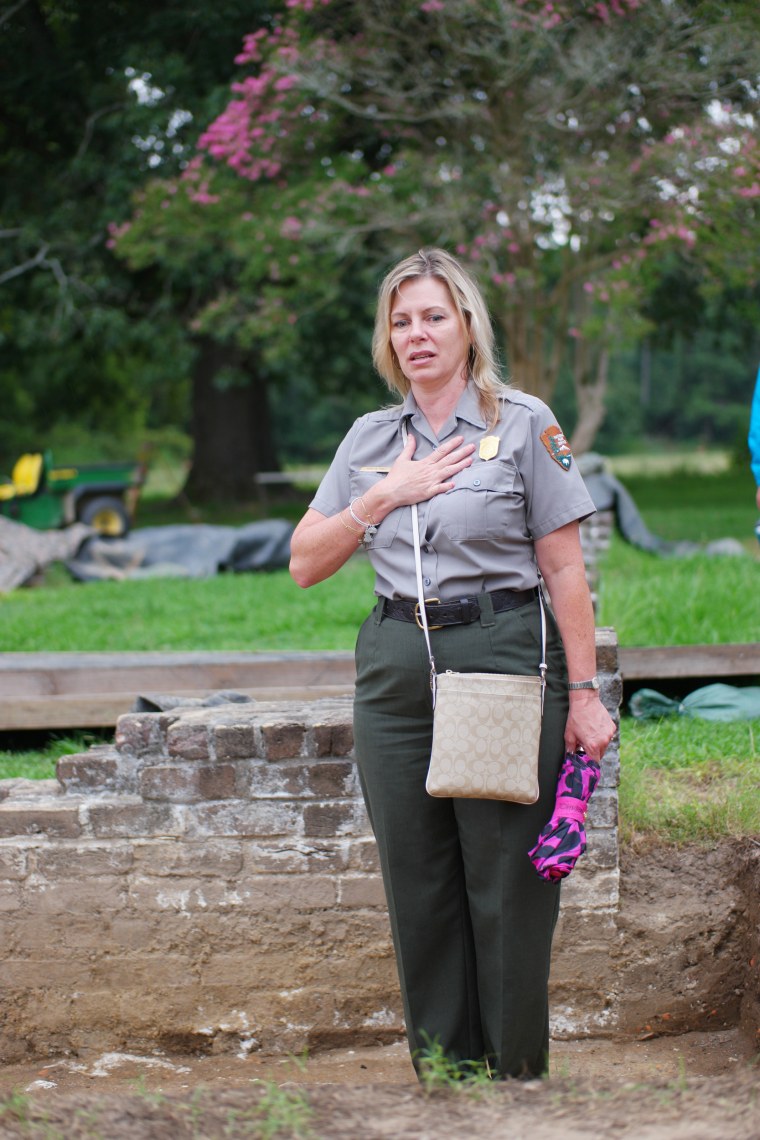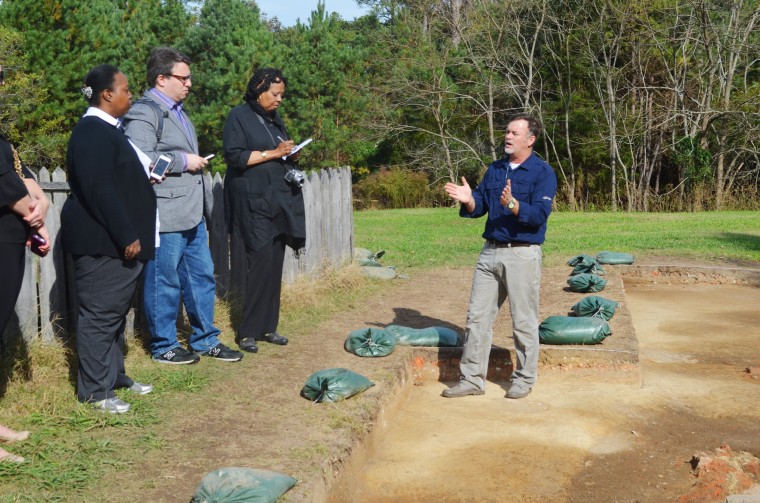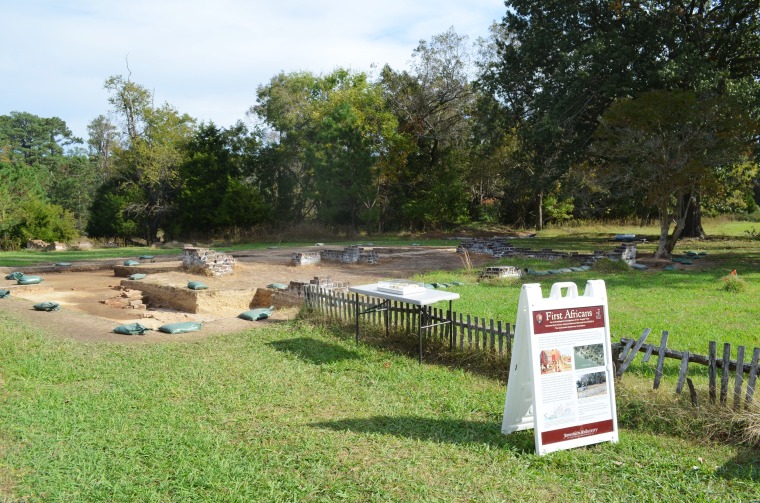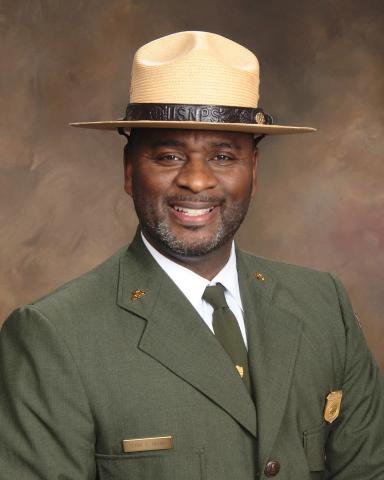JAMESTOWN, Virginia – Colonial National Historical Park Superintendent Kym Hall was emotional, as she stood in a dusty, 400-year-old trench lined with faded bricks not far from the James River.
Her eyes were filled with tears, as she passionately spoke to a small crowd about an unprecedented archaeological discovery on Jamestown Island, with a small crowd gathered around her.
After months of excavation, archaeologists believe the weather-worn former settlement is the “only known accessible site that can be directly associated with the documented occupation of one of the first Africans to arrive in English America.”
Of the nine enslaved Africans who lived in Jamestown in 1625, only one “Negro Woman” was identified by name after she arrived on a slave ship in 1620: Her name was Angela.
“The story of ‘Angela’ is about a woman and the empathy that comes from what this woman in history experienced,” Hall told NBC News. “Who would she have missed? Who would she have left back in Angola? Who would she be worried about and wondering about? What were her fears about the unknown?”

Angela, according to historical records, was a “servant” in the household of Captain William Pierce, an influential Virginia politician who served as lieutenant governor of Virginia.
From 1625 to the mid-1640s, park officials said, Pierce and his family lived on a parcel of land in New Towne, Virginia known as “Back Street.” Archaeologists discovered the remains of Pierce’s brick home in a sprawling field overlooking the James River.
For Hall, a 28-year veteran of the National Park Service, the half-acre archaeological site is hallowed land.
“I’m looking at ground where she [Angela] stood, I’m looking at a river she would have looked at,” Hall said. “If people can take the time to stand where Angela stood, to understand who she is, maybe the idea of what she experienced will be a message of hope, even though some people want to pretend this [slavery] wasn’t a big deal.”
Angela was taken from Angola and forced aboard a Portuguese slave ship, the Sao Ja Bautista, in the early summer of 1619, sailing from Luana, the capital of Portuguese Angola, and bound for the port of Vera Cruz, on the coast of Mexico. Of the 350 enslaved Africans aboard the Sao Ja Bautista, historians say, only 147 arrived in Vera Cruz.
In August, the Sao Ja Bautista was attacked off Campeche, Yucatan by two English ships. Angela was taken aboard one of the ships, Treasurer, which eventually anchored in Virginia in 1620. Angela was one of 29 enslaved Africans aboard the Treasurer. She survived wars in Africa, historians said, a brutal crossing from Angola, and pirate attacks on the high seas.
Not much is known about Angela, but the archaeological work is ongoing. Historians believe Angela was in her mid-30s and it does not appear that she was married or had children.
The Rev. Reginald F. Davis, pastor of The First Baptist Church in Williamsburg, Virginia, said the ‘Angela’ site marks an important contribution to Virginia’s African-American history.
“This ‘Angela’ site is significant because our history has been hidden and buried,” Davis told NBC News. “This soil reminds us that we are a strong people, a resilient people, a proud people. It’s also a reminder that we must take our freedom and our destiny in our own hands.”
Davis, whose historic church was founded in 1776 by enslaved Africans and free blacks, said it’s important for the African-American community to be linked to the ‘Angela’ site.

“Out of this dust comes a connection to our past that will be significant for generations to come,” Davis said. “If we can connect more young African-Americans to the field of archaeology, it will give them incentive to learn more about our history.”
The ‘Angela’ project coincides with “American Evolution,” an event that will take place in 2019 to mark the 400th anniversary of the first representative legislative assembly in the New World, the arrival of the first recorded Africans to English North America, and the recruitment of English women in significant numbers.
William Kelso, Director of Archeology for the Jamestown Rediscovery Project, has studied the sites of enslaved Africans since 1969 and has supervised excavation of the ‘Angela’ site for more than a year. Historians found Angela’s name in a colony-wide “muster," or census, recorded by English settlers.
“We’re able to add a visual connection to the past. This is a rare documented case where we can give this enslaved woman, Angela, a personality," Kelso told NBC News. "We know she lived on this particular ground. This was the genesis of an early culture in Virginia that included Africans and the discovery of this enslaved woman is a rarity never explored before.”
Dr. Cassandra Newby-Alexander, Professor of African-American History at Norfolk State University, said the discovery of ‘Angela’ has broad implications.
“The eyes of the nation have once again focused on the Commonwealth of Virginia with the story of Angela’s journey from the Angolan region of Africa to North America,” Newby-Alexander told NBC News.
“For too long, this story was ignored,” she said. “While we may never know about the thoughts and ambitions of Angela and those like her who were forced to come to Virginia, the potential is there to understand more about their cultural underpinnings.”
Hall said she experienced a surreal connection to the Angela site and is sharing details of the discovery with Virginia’s African-American community.
“These are some of our nation’s most powerful stories — things we are proud of and things we are ashamed of,“ Hall said. “Angela is a person who brings a reality to the origins of slavery. She gives a name and we can conjure a face to this human being who experienced these atrocities for so long.”


